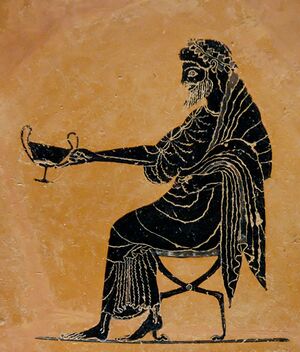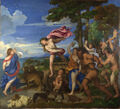Dionysos (nonfiction): Difference between revisions
No edit summary |
|||
| Line 24: | Line 24: | ||
File:Bacchus and Ariadne by Titian.jpg|link=Dionysian (nonfiction)|[[Dionysian (nonfiction)|Dionysian behavior]]: ''Bacchus and Ariadne'' by Titian. | File:Bacchus and Ariadne by Titian.jpg|link=Dionysian (nonfiction)|[[Dionysian (nonfiction)|Dionysian behavior]]: ''Bacchus and Ariadne'' by Titian. | ||
File:Irish_drinking_Arkansas_riots_Scientific_American_1849.png|Irish drinking, Arkansas riots. Excerpt from ''Scientific American'' (1849). | File:Irish_drinking_Arkansas_riots_Scientific_American_1849.png|Irish drinking, Arkansas riots. Excerpt from ''Scientific American'' (1849). | ||
File:Dionysos bronze head.jpg|thumb|Bronze Head of Dionysos, confined in museum display case, yearns to run free. | |||
</gallery> | </gallery> | ||
Revision as of 08:33, 3 December 2017
Dionysos (or Dionysus) (/daɪ.əˈnaɪsəs/; Greek: Διόνυσος, Dionysos) is the god of the grape harvest, winemaking and wine, of ritual madness, fertility, theater, and religious ecstasy in Greek mythology.
Alcohol, especially wine, played an important role in Greek culture with Dionysus being an important reason for this life style.
His name, thought to be a theonym in Linear B tablets as di-wo-nu-so (KH Gq 5 inscription), shows that he may have been worshipped as early as c. 1500–1100 BC by Mycenean Greeks; other traces of the Dionysian-type cult have been found in ancient Minoan Crete.
His origins are uncertain, and his cults took many forms; some are described by ancient sources as Thracian, others as Greek.
In some cults, he arrives from the east, as an Asiatic foreigner; in others, from Ethiopia in the South.
Melampus of Argos introduced the worship of Dionysus, according to Herodotus.
Dionysus is a god of epiphany, "the god that comes", and his "foreignness" as an arriving outsider-god may be inherent and essential to his cults.
He is a major, popular figure of Greek mythology and religion, and is included in some lists of the twelve Olympians.
Dionysus was the last god to be accepted into Mt. Olympus. He was the youngest and the only one to have a mortal mother.
His festivals were the driving force behind the development of Greek theater. Modern scholarship categorizes him as a dying-and-rising god.
In the News
Dionysian behavior: Bacchus and Ariadne by Titian.
Fiction cross-reference
Nonfiction cross-reference
- Melampus (nonfiction) - introduced the worship of Dionysus, according to Herodotus.
External links:
- Dionysus @ Wikipedia



